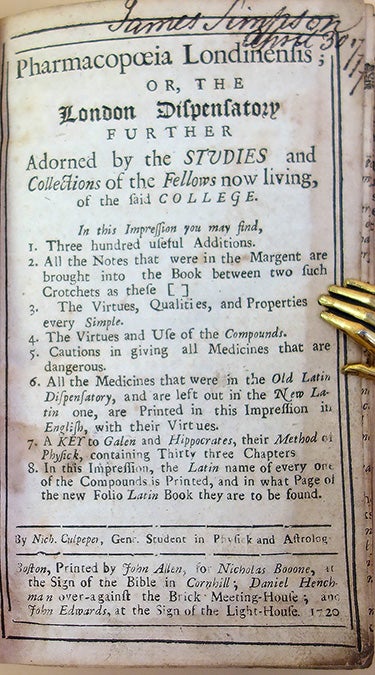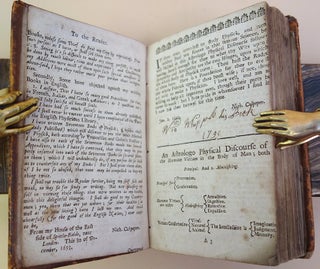Pharmacopoeia Londinensis
Publisher Information: Boston: John Allen for Nicholas Boone ... 1720.
Culpeper, Nicholas (1616-54). Pharmacopoeia Londinensis; or, the London dispensatory further adorned by the studies and collections of the fellows now living, of the said college. 8vo. [24], 305, [39]pp. Boston: John Allen for Nicholas Boone. . . Daniel Henchman. . . and John Edwards, 1720. 175 x 113 mm. American blind-tooled sheep ca. 1720, spine cracked, inner hinges repaired, some rubbing and edgewear. Margins of first few leaves trimmed touching some text, some toning as is usual for American books of this era, but very good. Ownership signatures of James Simpson (dated April 30, 1777) and William Whipple (dated 1750).
First American Edition. This 1720 Boston edition of Culpeper’s Pharmacopoeia Londinensis enjoys the triple distinction of being the first herbal, the first pharmacopoeia, and the first full-length medical book published in the American colonies. It is the earliest American medical book possibly obtainable today. This copy is also remarkable for its original American blind-tooled sheep binding. This is also probably one of the earliest American bindings that one could expect to obtain today.
The only known predecessors of our edition are the unique surviving copy of Thomas Thatcher’s Brief Rule to Guide the Common People of New England. . . in the Small Pocks or Measles (Boston, 1677; described as “a single sheet of paper”), and a 1708 Boston reprint of The English Physician, ascribed to Culpeper on the title-page, but most probably only as an attempt to capitalize on his famous name. The 1708 edition has been essentially unobtainiable since the 19th century. The American edition of Culpeper’s work enjoyed a wide popularity in the colonies, perhaps because of its Puritan slant and its bias toward the household treatment of illness. Culpeper’s writings show a genuine interest in providing health care for the poor: his remedies contained only cheap, readily obtainable English herbs, and on his deathbed, he stated that he “never gave a patient two medicines where one would serve.” It was this populist attitude toward medical care that had prompted Culpeper in 1649 to publish his English translation of the Pharmacopoeia Londiniensis, an act that earned him the enmity of London’s medical establishment. Austin 591. Cowen, “Boston editions of Nicholas Culpeper,” Journal of the History of Medicine and Allied Sciences 9 (1956), pp. 156-165. Garrison-Morton.com 1828.2. Norman C-542.
Book Id: 44533
Price: $30,000.00



